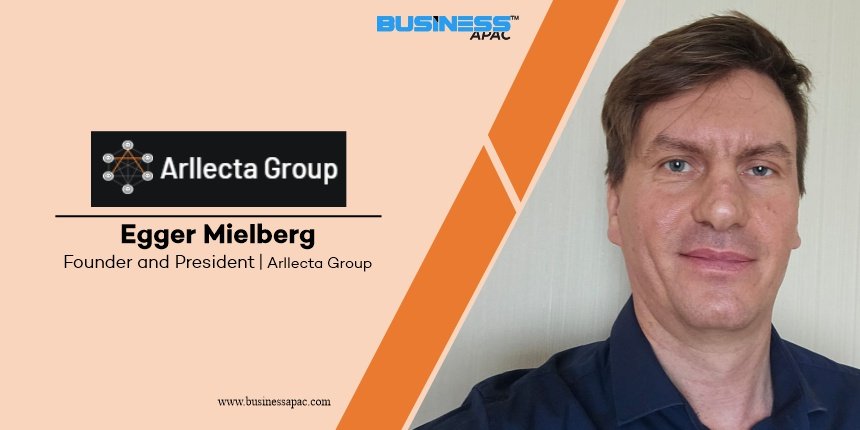Generative models like GPT-4 depend on the data they are trained on. They generate content by learning patterns and structures from that data. However, unlike humans, these models don’t understand the content. Instead, they mimic the style and context of their training data.
While humans use logic and context to understand text, generative models rely on statistical correlations. This can sometimes lead to outputs that seem logical but lack deeper meaning. As a result, generative models may produce inconsistent results or struggle with complex reasoning.
To address these limitations and make AI more human-like, Egger Mielberg and his team bring over 12 years of experience in Machine Learning, Artificial Intelligence, and Mathematical Modeling.
As the founder and president of Arllecta Group, Mielberg has pioneered self-learning and predictive networks specifically designed for AI tasks. His groundbreaking ‘Sense Theory’ and the scalable ‘Proof of Participation Protocol (PoPP),’ form the backbone of Arllecta’s revolutionary AI-powered solutions.
Arllecta Group now offers seven core AI solutions for businesses. These include ‘Speech Recognition/Speech Synthesis,’ ‘Intention System,’ ‘Speech Analytics,’ ‘Chat Mail,’ ‘Personal Mobile Concierge,’ ‘Search Intellect,’ and the ‘Medical Diagnostic System.’
In this conversation, we uncover the transformative journey of Egger Mielberg, exploring how his revolutionary approach is setting new benchmarks in AI and shaping the future of business intelligence.
Business APAC: Could you explain your groundbreaking concept, ‘Sense Logic,’ in simple terms for our readers?
Mielberg: Imagine innovation as a train moving at the speed of light. Now, if you want to reach your destination even faster, traditional physics would tell you it is impossible.
However, from the perspective of ‘Milberg’s Sense Logic,’ it is possible. It suggests that one condition must be met – the user must be able to change the speed of the train with his logical (sense) actions.
In other words, the user’s logic must describe the logic of the train’s movement.
Business APAC: Could you share your background and career journey? What inspired you to pursue AI and machine learning?
Mielberg: I have always identified my career with the people I have met along my life path at one time or another.
In 2014, while working as an external chief solution architect for a major U.S. logistics company, I developed the “Neuro-Amorphic Function” for a mathematical price-per-mile model.
By early 2016, Blockchain technology sparked my interest, leading my team and me to explore new banking service concepts. This led to the development of two innovative technologies: “Proof of Participation (PoP): Asynchronous Byzantine Activity-Oriented Protocol” and “Decentralized Chain of Transactions: Neurochain.”
In 2018, I shifted my focus to creating a new generation of artificial intelligence based on a sense-to-sense paradigm. This effort resulted in the creation of “Sense Theory” and “ArLLecta: A Decentralized Sense-To-Sense Network.”
By 2019, a large European telecommunications holding company recognized the practical value of ArLLecta technology. In 2020, after completing Proof of Concept events, this company became our first major customer, even though our services were still in the alpha testing stage.
Reflecting on my journey, I can say that my choice of AI was probably influenced to a greater extent by my basic education and great love for mathematics and biology. And, of course, a tireless daily desire to learn something new. I repeat every day desire without weekends and holidays.
Business APAC: Given the increasing integration of voice communication in software products, what do you see as the primary limitations of current generative models in real-world business applications?
Mielberg: When we talk about core AI algorithms, like speech recognition, speech synthesis, and generative text models, there is a clear trend of increased integration into business processes.
However, generative models are still largely experimental, detached from real-world business processes due to the underdevelopment of their logical and semantic components. Essentially, current generative models are limited to retelling the text they’ve been trained on, with variations only in the style of retelling.
The adaptation of AI algorithms directly depends on successful business cases in specific sectors. For example, AI’s ability to perform high-quality legal analysis of sales contracts could eventually challenge the traditional role of human lawyers.
Business APAC: Could you please elaborate on Arllecta’s core offerings and what makes them unique?
Mielberg: Arllecta’s uniqueness lies in our proprietary AI technologies, giving us distinct advantages over other companies. One key benefit is our complete technological independence from global AI market solutions and third-party vendors. This independence allows us to operate with greater flexibility and control.
The second and most significant advantage is the exceptional security we provide to our users. For instance, one of our products, Sense Chain, is a business network designed to support global businesses of any financial scale and complexity.
Our security system has proven its superiority over many similar solutions in the market. To test it, we engaged 30 of the most skilled hackers to attempt a breach of our network’s financial block. None succeeded in compromising user assets. We confidently guarantee 100% safety of user assets worldwide.
Business APAC: How do your clients leverage speech analytics to address key business challenges, especially in employee performance evaluation?
Mielberg: Many of our clients are focused on speech analytics. They often face two main challenges. First, they need to make business decisions quickly and identify which employees excel in meeting these demands.
Second, they want to ensure that individual employees meet KPI standards. AI analysis of online meetings has become invaluable in helping them assess employee performance.
This technology is increasingly relevant as many countries face a catastrophic shortage of competent employees.
Business APAC: Being at the helm of the company, how do you manage the strategic, operational, and leadership aspects of your position?
Mielberg: At Arllecta Group, we actively implement our AI solution based on our proprietary Sense Theory algorithms. This AI assists with all the operational and strategic tasks of the company. With seven companies worldwide, it’s noteworthy that 80% of our employees either work remotely or have their roles augmented by our AI.
Regarding leadership, using our AI introduces a unique challenge: we become reliant on the principles and behavior of the AI, which, in turn, reflect the creator’s mindset. Since I developed the core of our AI, in a way, I find myself working with my own thought processes and principles.
Business APAC: What key metrics do you use to measure the success and impact of your services?
Mielberg: For us, the primary measure of a software product’s success is the number of users it attracts, particularly the monthly growth in users. As a young company, we focus on expanding our global user base by ensuring the security of user assets, which we consider the key indicator of our quality work. The ultimate criterion for success is the trust users place in us for the long-term safety of their assets.
Another measure of our service’s success is the adoption of our AI mathematics paradigm by third-party services. We’re already seeing this in the implementation of several well-known generative models that utilize descriptive semantics, which closely mirror the algorithms of our Sense Theory.
Business APAC: What drives your passion for solving complex problems, and how has this shaped your approach to your work?
Mielberg: I never thought about a career as such. I always wanted to solve complex problems that had not been solved by the best minds of our civilization before me. My motivation has always been—and continues to be—focused on tasks that can significantly improve the human experience on this planet. I have a deep interest in the practical application of new technologies.
One challenge I would note is that the current global financial system does not assume the presence of many people with mental work, especially creative ones. This reality highlights that humanity still needs many centuries to come to mutual respect and understanding between nations. And it’s a little upsetting.
Business APAC: What are your future goals, and can you share any insights into new markets or services you plan to explore?
Mielberg: Over the next 10-15 years, I have a clear vision of what I want to focus on advancing my proprietary AI and developing an elixir of longevity. The AI is based entirely on the algorithms of our Sense Theory and neuro-amorphous functions, areas where I see significant potential for further development and practical application.
As for the elixir of longevity, I am deeply convinced that its key lies in understanding the causes of tumor cells. My team and I have made substantial progress in this area, and we are now moving towards launching our own clinical diagnostic laboratory. This will allow us to conduct clinical studies to validate our approach to uncovering the true causes of cancer.
Business APAC: How do you manage to have a perfect work-life balance?
Mielberg: The answer is simple—my work is my life. I love what I do, so I don’t need extra motivation to do painstaking, long work every day in the morning. For me, a happy life is waking up every morning with a clear understanding of why you woke up.
Quote
“Time is the main asset in the life of any intelligent biological being. Spend it only on creation and not on the ambitions of people who are strangers to you!”
Also Read: The 10 Most Iconic CEO’s to Watch In, 2024















